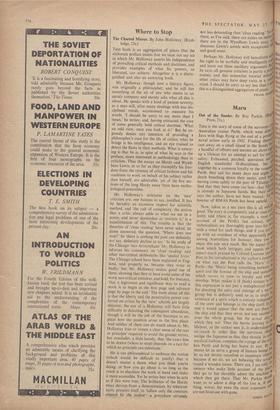Where to Stop
THIS book is an aggregation of pieces (but the elaborate preface insists that we must not say so) in which Mr. Holloway asserts his independence of prevailing critical methods and doctrines, and provides examples of what his powers, so liberated, can achieve. Altogether it is a distin- guished and also an annoying book.
Mr. Holloway, though now a literary figure, was originally a philosopher, and he still has something of the air of one who enters to an unruly company and sternly asks what all this is about. He speaks with a kind of patient severity, as a man still, after many dealings with less dis- ciplined minds, accustomed to measure his words. 'I should be sorry to say more than I mean,' he writes; and, having extracted the core of some generally held critical doctrine, 'What an odd view, once you look at it!' But he ex- pressly denies any intention of providing a philosopher's cure for the ills of critics; what he brings is his intelligence, and an eye trained to detect the flaws in their methods. What is annoy- ing is that he is, in spite of what he says in the preface, more interested in methodology than in criticism. Thus the essays on Hardy and Wynd- ham Lewis, in so far as they exemplify his free- dom from the tyranny of critical fashion and his readiness to work on behalf of his subject rather than himself, are admirable; yet of the five sec- tions of the long Hardy essay three have metho- dological preambles.
Mr. Holloway's strictures on the 'new' criticism are, one hastens to say, justified. It has by heredity an excessive respect for scientific method, and 'the cult of complexity, the notion that a critic always adds to what we see in a poem, and never diminishes or restricts it,' is a manifestation of this. The trouble is that the theorists of 'close reading' have never asked, let alone answered, the question, 'Where does one stop?' So 'there is nothing the poet can definitely not say, definitely decline to say.' In his study of the Chicago `neo-Aristotelians' Mr. Holloway re- inforces his comments on 'close reading' and other neo-critical shibboleths like 'spatial form.' The Chicago school have been neglected in Eng- land, and properly so, because they write so badly; but Mr. Holloway makes good use of them, showing that they at least avoid some of the worst neo-critical mistakes, and hold, for instance,
'that a, legitimate and significant way to read a work is to begin at the first page and advance page by page to the end.' The truth about all this is that the liberty and the penetrative power con- ferred on critics by the 'new' schools are largely delusive; the eye of a Holloway will have little difficulty in detecting the consequent absurdities, though it will be the job of the historian to ex- plain how the position arose in the first place.
And neither of them can do much about it; Mr.
Holloway tries to 'create a clear sense of the tact or principle' required to avoid the grosser errors,
but concludes, a little lamely, that 'the exact line to be drawn (where to stop) depends on a tact for which no principle can substitute.'
He is too philosophical to embrace the notion (which would be difficult to justify) that it doesn't matter a damn what you think you're doing, or how you go about it, so long as the result is to elucidate the work in hand and make it more accessible. Yet he writes best when he acts as if this were true. The brilliance of the Hardy essay derives from a determination, by whatever tactic presents itself, to 'follow only the contours created by the author'—a procedure certainly
not less demanding than 'close reading.' Yet, there, as I've said, there are asides on rneth",1 there are in the Wyndham Lewis essay. discusses Lewis's novels with exceptional el' and good sense.
;SO Perhaps Mr. Holloway will henceforth as
his right to be tactfully and intelligently eel49 and leave out these ancillary arguments. 104 he says, all genuine criticism is partly a pets matter, and this somewhat tutorial attitatv other critics may have deep roots in a val mind. I should be sorry to say less than this is a distinguished aggregation of pieces. of
FRANK KO FRANK KO






































 Previous page
Previous page